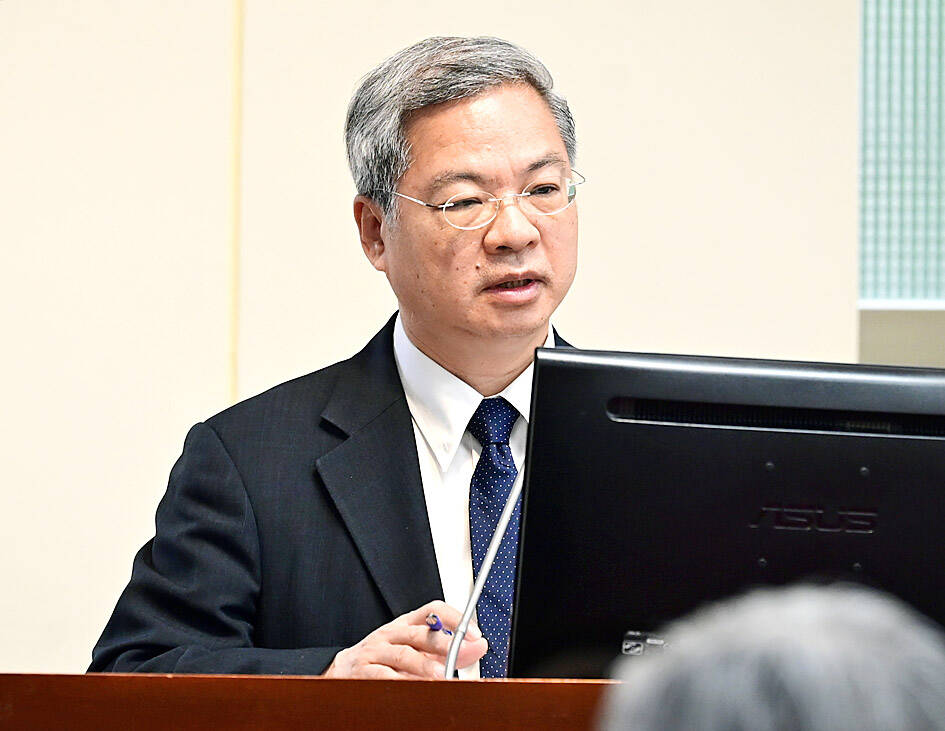The technical issues in the Taiwan-US tariff negotiations have mostly been resolved, and the government is waiting for a concluding meeting with the US side, Minister of Economic Affairs Kung Ming-hsin (龔明鑫) said yesterday.
Once the meeting is held, a deal could be reached to lower the US’ “reciprocal” tariff rate and avoid stacking it on top of existing levies, Kung said on the sidelines of a meeting of the legislature’s Economics Committee in Taipei.
However, as the APEC summit is to be held in South Korea on Friday and Saturday next week, and the US still has meetings with ASEAN, the deal might not be finalized by the end of this month and could be delayed until the end of the year, he said.

Photo: Wang Yi-sung, Taipei Times
The minister’s remarks came after President William Lai (賴清德) on Tuesday said at a hardware expo in Taichung that there should be solid progress soon in negotiations over US tariffs on Taiwanese goods.
Lai said the government would strive to lower the current 20 percent tariff without it being stacked on top of existing levies and seek most-favored-nation treatment from the US regarding the outcome of a Section 232 investigation under the US Trade Expansion Act of 1962.
The negotiations did not involve discussions on exchange rate issues, he added.
As US President Donald Trump visits Asia, and the US and South Korea are expected to make progress in tariff negotiations to lower the rate to 15 percent — the same as Japan — lawmakers have raised concerns about potential pressure on Taiwanese manufacturers.
Taiwanese manufacturers have to compete with Japan and South Korea on many products, but the challenge lies in Taiwan’s much larger trade surplus with the US compared with the two countries, Kung said.
The government would negotiate to reach a better rate, he added.
While Taiwan’s tariff delegation is mainly focused on the manufacturing sector during the negotiations, the issue of importing US-made vehicles with lower levies is also part of the talks, Kung said, adding that if other countries attempt to circumvent tariffs by exporting cars to Taiwan through the US, the government would not allow it.
Under current regulations, imported cars are subject to a 17.5 percent tariff, while commodity tax rates range from 25 to 30 percent depending on the model. The key difference is that tariffs apply only to imported cars, while the commodity tax applies to imported and locally made vehicles.
The ministry said in June that the government is focused on negotiating the tariff rate first before addressing the commodity tax rate.

RECYCLE: Taiwan would aid manufacturers in refining rare earths from discarded appliances, which would fit the nation’s circular economy goals, minister Kung said Taiwan would work with the US and Japan on a proposed cooperation initiative in response to Beijing’s newly announced rare earth export curbs, Minister of Economic Affairs Kung Ming-hsin (龔明鑫) said yesterday. China last week announced new restrictions requiring companies to obtain export licenses if their products contain more than 0.1 percent of Chinese-origin rare earths by value. US Secretary of the Treasury Scott Bessent on Wednesday responded by saying that Beijing was “unreliable” in its rare earths exports, adding that the US would “neither be commanded, nor controlled” by China, several media outlets reported. Japanese Minister of Finance Katsunobu Kato yesterday also

Jensen Huang (黃仁勳), founder and CEO of US-based artificial intelligence chip designer Nvidia Corp and Taiwan Semiconductor Manufacturing Co (TSMC, 台積電) on Friday celebrated the first Nvidia Blackwell wafer produced on US soil. Huang visited TSMC’s advanced wafer fab in the US state of Arizona and joined the Taiwanese chipmaker’s executives to witness the efforts to “build the infrastructure that powers the world’s AI factories, right here in America,” Nvidia said in a statement. At the event, Huang joined Y.L. Wang (王英郎), vice president of operations at TSMC, in signing their names on the Blackwell wafer to

‘DRAMATIC AND POSITIVE’: AI growth would be better than it previously forecast and would stay robust even if the Chinese market became inaccessible for customers, it said Taiwan Semiconductor Manufacturing Co (TSMC, 台積電) yesterday raised its full-year revenue growth outlook after posting record profit for last quarter, despite growing market concern about an artificial intelligence (AI) bubble. The company said it expects revenue to expand about 35 percent year-on-year, driven mainly by faster-than-expected demand for leading-edge chips for AI applications. The world’s biggest contract chipmaker in July projected that revenue this year would expand about 30 percent in US dollar terms. The company also slightly hiked its capital expenditure for this year to US$40 billion to US$42 billion, compared with US$38 billion to US$42 billion it set previously. “AI demand actually

RARE EARTHS: The call between the US Treasury Secretary and his Chinese counterpart came as Washington sought to rally G7 partners in response to China’s export controls China and the US on Saturday agreed to conduct another round of trade negotiations in the coming week, as the world’s two biggest economies seek to avoid another damaging tit-for-tat tariff battle. Beijing last week announced sweeping controls on the critical rare earths industry, prompting US President Donald Trump to threaten 100 percent tariffs on imports from China in retaliation. Trump had also threatened to cancel his expected meeting with Chinese President Xi Jinping (習近平) in South Korea later this month on the sidelines of the APEC summit. In the latest indication of efforts to resolve their dispute, Chinese state media reported that